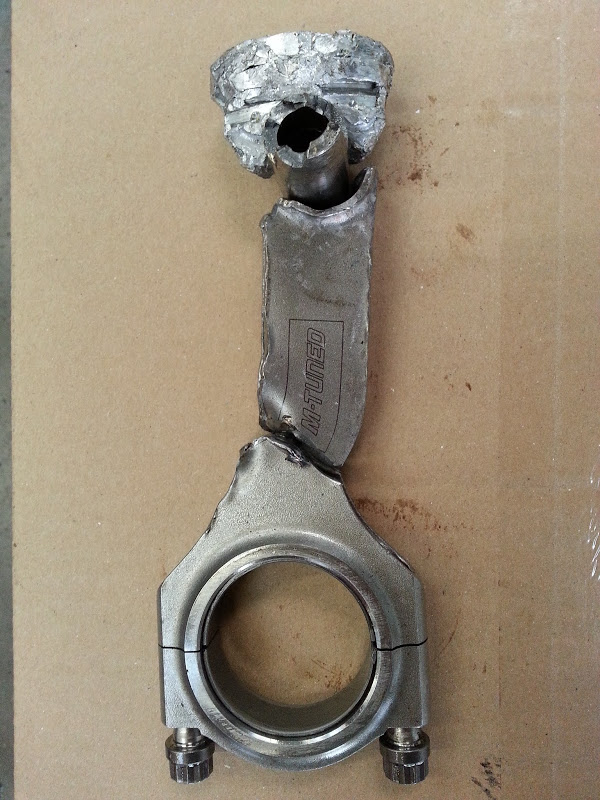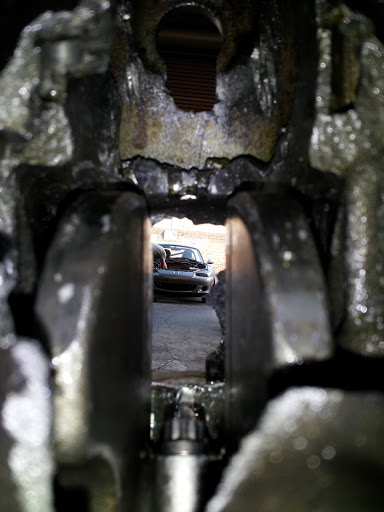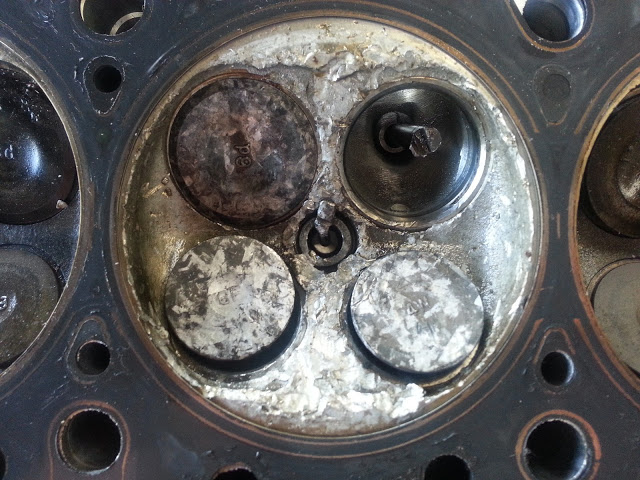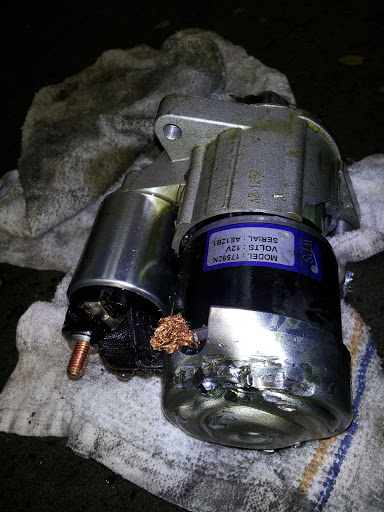Rebuilding Engine, Some Recommendations Needed
#1
I'm slowly putting together pieces for my engine rebuild.
My end goal is to build fresh reliable enough motor to withstand turbo.
For turbo I have T25 in hand, my current power goal is around 220-230whp.
But I want to have enough head room to handle 300whp.
What I currently on hand is
Complete 94 BP Block, pistons/rods/crank
Complete 99-00 Head
Planning on doing full rebuild for bottom end, replacing bearings, oil pump, with forged rods. Head rebuild with new valve springs and retainers.
Now my question is...
Would I really need to go forged piston to handle this kind of power?
From what I read, OEM 9:1 pistons handle power pretty well.
Also from what I've read with forged pistons, I need to have more clearance to cylinder wall because they expand more than cast, worry about piston slap, and won't last as cast iron pistons.
I'm not trying to cut corners to save money on my engine build, I'm not sure using forged piston is correct approach for this build. What do you guys think? and any experience in this type of rebuild?
My end goal is to build fresh reliable enough motor to withstand turbo.
For turbo I have T25 in hand, my current power goal is around 220-230whp.
But I want to have enough head room to handle 300whp.
What I currently on hand is
Complete 94 BP Block, pistons/rods/crank
Complete 99-00 Head
Planning on doing full rebuild for bottom end, replacing bearings, oil pump, with forged rods. Head rebuild with new valve springs and retainers.
Now my question is...
Would I really need to go forged piston to handle this kind of power?
From what I read, OEM 9:1 pistons handle power pretty well.
Also from what I've read with forged pistons, I need to have more clearance to cylinder wall because they expand more than cast, worry about piston slap, and won't last as cast iron pistons.
I'm not trying to cut corners to save money on my engine build, I'm not sure using forged piston is correct approach for this build. What do you guys think? and any experience in this type of rebuild?
#3
Stock pistons will handle that power easily, rods are the weak point before pistons. 9:1 is a friendly ratio for boost.
Pistons are not cast iron, they are cast aluminum, even in stock form. Forged aluminum would be the Supertechs, Wisecos, etc.
If you search for it, you will find some info in here from people like Emilio and Savington regarding the different alloys that aftermarket pistons are made of. My understanding is that while a forged piston does indeed need different clearances and usually does not have the longevity of an OEM cast piston, Supertechs are pretty mild and do not experience things like piston slap on cold startup as much as some others. You certainly can DD an engine with forged pistons and get 30K plus miles out of it before its out of good compression, probably a lot more than that depending on ring gap and maintenance and application.
IIRC 949 sells a package that's comprised of Supertecs with Wiseco rings, which seems to be a really combination.
If I was building a BP for 300WHP, and I had it all apart, I would go with forged pistons.
Pistons are not cast iron, they are cast aluminum, even in stock form. Forged aluminum would be the Supertechs, Wisecos, etc.
If you search for it, you will find some info in here from people like Emilio and Savington regarding the different alloys that aftermarket pistons are made of. My understanding is that while a forged piston does indeed need different clearances and usually does not have the longevity of an OEM cast piston, Supertechs are pretty mild and do not experience things like piston slap on cold startup as much as some others. You certainly can DD an engine with forged pistons and get 30K plus miles out of it before its out of good compression, probably a lot more than that depending on ring gap and maintenance and application.
IIRC 949 sells a package that's comprised of Supertecs with Wiseco rings, which seems to be a really combination.
If I was building a BP for 300WHP, and I had it all apart, I would go with forged pistons.
#5
Stock pistons will handle that power easily, rods are the weak point before pistons. 9:1 is a friendly ratio for boost.
Pistons are not cast iron, they are cast aluminum, even in stock form. Forged aluminum would be the Supertechs, Wisecos, etc.
If you search for it, you will find some info in here from people like Emilio and Savington regarding the different alloys that aftermarket pistons are made of. My understanding is that while a forged piston does indeed need different clearances and usually does not have the longevity of an OEM cast piston, Supertechs are pretty mild and do not experience things like piston slap on cold startup as much as some others. You certainly can DD an engine with forged pistons and get 30K plus miles out of it before its out of good compression, probably a lot more than that depending on ring gap and maintenance and application.
IIRC 949 sells a package that's comprised of Supertecs with Wiseco rings, which seems to be a really combination.
If I was building a BP for 300WHP, and I had it all apart, I would go with forged pistons.
Pistons are not cast iron, they are cast aluminum, even in stock form. Forged aluminum would be the Supertechs, Wisecos, etc.
If you search for it, you will find some info in here from people like Emilio and Savington regarding the different alloys that aftermarket pistons are made of. My understanding is that while a forged piston does indeed need different clearances and usually does not have the longevity of an OEM cast piston, Supertechs are pretty mild and do not experience things like piston slap on cold startup as much as some others. You certainly can DD an engine with forged pistons and get 30K plus miles out of it before its out of good compression, probably a lot more than that depending on ring gap and maintenance and application.
IIRC 949 sells a package that's comprised of Supertecs with Wiseco rings, which seems to be a really combination.
If I was building a BP for 300WHP, and I had it all apart, I would go with forged pistons.
biggest thing for me to consider OEM was longevity and piston slap. I drive my car for very short trip, less than 8 miles one way. I'll probably shut my car down just when engine gets warm enough. Also I can't seem to find correct answer for piston to wall clearance. If I go too wide, there will be piston slap and if I go too narrow, I might scrap piston wall.
I read going narrow is good for dd but not good for track. There seems to be so much variable when using forged pistons.
Is there a good piston to wall clearance that will work as good as OEM pistons? OEM pistons seems to last forever in NA setting, they even seem to last pretty long time with FI because weak link seems to be the rods, not pistons.
This is my biggest dilemma. Im not trying to cut corners on my build, I'm just not sure if going forged is correct answer for me.
#6
I never considered running e85 but I live on post housing (military) so I have healthy supply at the local gas station, which is about a mile away.
#7
if you have access to it, its 200% better than pump gas.
that said, if your machine shop does a good job, you shouldn't get any piston slap or issues with supertechs. p2w and ring clearances can be researched, but I'd suggest a good conversation with your machinist about it
unless you run full time e85, I'd still recommend forged pistons
that said, if your machine shop does a good job, you shouldn't get any piston slap or issues with supertechs. p2w and ring clearances can be researched, but I'd suggest a good conversation with your machinist about it
unless you run full time e85, I'd still recommend forged pistons
#11
ok, seems like as long as I get the clearance correct, I can run forged pistons wo getting any knock, correct?
from what I gather...
more p2w clearance
PROS
more power
CONS
more piston slap
more blow-by-gas
faster wear and tear
less p2w clearance
PROS
longevity from engine
less/no piston slap
CONS
less power
chance of piston scraping wall under heavy load
If I build engine with forged pistons, seems like I need to get clearance as tight as possible according to manufacturer's recommendation, correct?
I might be just stupid and hard headed but I'm still not convinced using forged pistons will be more reliable than OEM pistons over time with the power goal i have. I'm NOT trying to tear apart engine every 30k miles for rebuild. I see people running 230whp on stock internals for 100k+ miles, and when they break stuff, I usually read story on rods. Are forged pistons really the way to go? What would be real world benefit going forged over OEM?
from what I gather...
more p2w clearance
PROS
more power
CONS
more piston slap
more blow-by-gas
faster wear and tear
less p2w clearance
PROS
longevity from engine
less/no piston slap
CONS
less power
chance of piston scraping wall under heavy load
If I build engine with forged pistons, seems like I need to get clearance as tight as possible according to manufacturer's recommendation, correct?
I might be just stupid and hard headed but I'm still not convinced using forged pistons will be more reliable than OEM pistons over time with the power goal i have. I'm NOT trying to tear apart engine every 30k miles for rebuild. I see people running 230whp on stock internals for 100k+ miles, and when they break stuff, I usually read story on rods. Are forged pistons really the way to go? What would be real world benefit going forged over OEM?
#12
not less power. just risk of seizing.
you need to make up your mind, and stop confusing yourself and frustrating everyone else
230whp? stay stock
250wph? probably ok to stay stock too
300whp? no more stock
I mean.....its as simple as that.
And how many people do you see rebuilding their forged motors after 30k?
The benefit is more strength to handle knock if your tuning sucks or you get bad gas or...........
That's the benefit. You wanna take chances or run e85, stay stock.
you need to make up your mind, and stop confusing yourself and frustrating everyone else
230whp? stay stock
250wph? probably ok to stay stock too
300whp? no more stock
I mean.....its as simple as that.
And how many people do you see rebuilding their forged motors after 30k?
The benefit is more strength to handle knock if your tuning sucks or you get bad gas or...........
That's the benefit. You wanna take chances or run e85, stay stock.
#13
not less power. just risk of seizing.
you need to make up your mind, and stop confusing yourself and frustrating everyone else
230whp? stay stock
250wph? probably ok to stay stock too
300whp? no more stock
I mean.....its as simple as that.
And how many people do you see rebuilding their forged motors after 30k?
The benefit is more strength to handle knock if your tuning sucks or you get bad gas or...........
That's the benefit. You wanna take chances or run e85, stay stock.
you need to make up your mind, and stop confusing yourself and frustrating everyone else
230whp? stay stock
250wph? probably ok to stay stock too
300whp? no more stock
I mean.....its as simple as that.
And how many people do you see rebuilding their forged motors after 30k?
The benefit is more strength to handle knock if your tuning sucks or you get bad gas or...........
That's the benefit. You wanna take chances or run e85, stay stock.

Hopefully I'll be able to start on my build soon.
Here are some stuff I have in hand. Everything is down to metal ready to be dropped off at the machine shop.
just need to collect internals to match the bore.
head
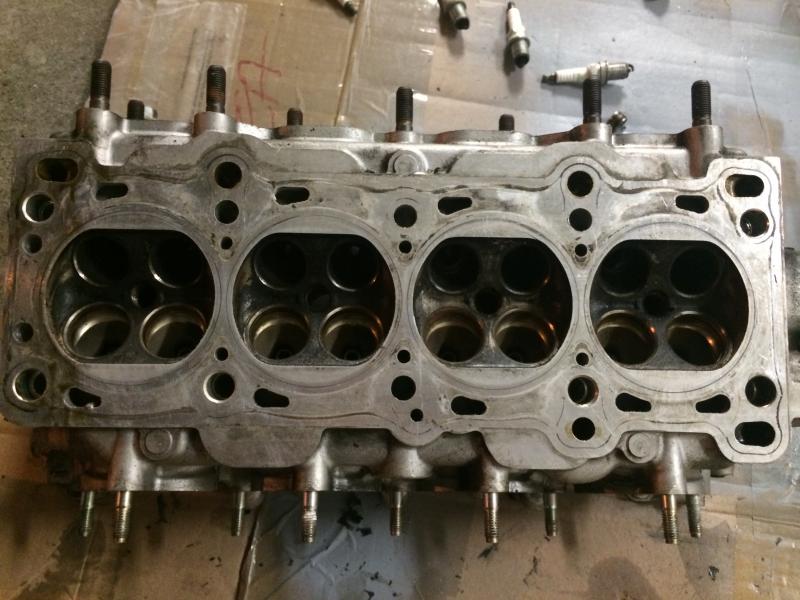
block
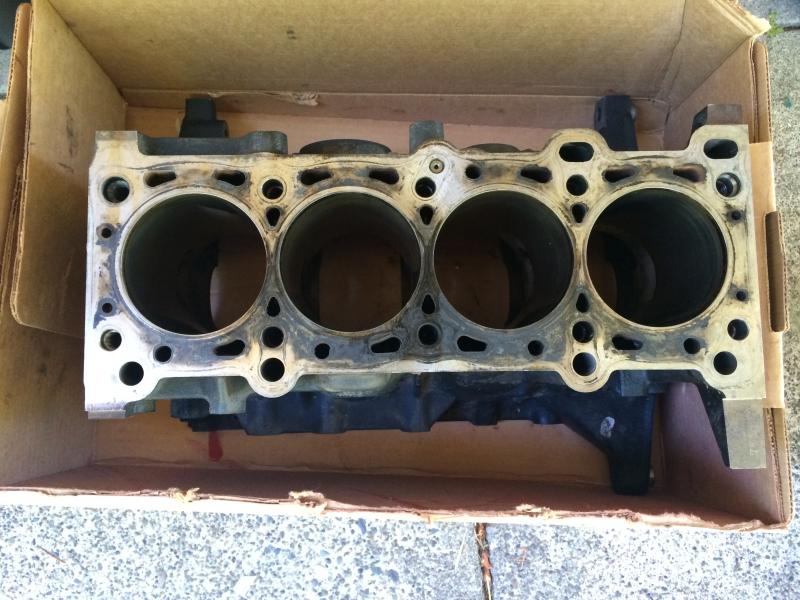
#17
Joined: Oct 2013
Posts: 520
Total Cats: 27
From: Goleta, Southern California
I run supertech 8.6.
PTW is at .0036" I've heard of others setting .0032 and some more track oriented builds set at closer to .004".
I have zero issues with slap.
I also drive my car on 10 mile each way daily comutes. I make it a point not to get into boost until I've reached 180 degrees oil temp. This means starting the car 10 minutes early or driving like a sane person for a few minutes.
Call the piston manufacture and ask them what they recomend. I called supertech and they gave me a recommendation.
PTW is at .0036" I've heard of others setting .0032 and some more track oriented builds set at closer to .004".
I have zero issues with slap.
I also drive my car on 10 mile each way daily comutes. I make it a point not to get into boost until I've reached 180 degrees oil temp. This means starting the car 10 minutes early or driving like a sane person for a few minutes.
Call the piston manufacture and ask them what they recomend. I called supertech and they gave me a recommendation.
#18
I run supertech 8.6.
PTW is at .0036" I've heard of others setting .0032 and some more track oriented builds set at closer to .004".
I have zero issues with slap.
I also drive my car on 10 mile each way daily comutes. I make it a point not to get into boost until I've reached 180 degrees oil temp. This means starting the car 10 minutes early or driving like a sane person for a few minutes.
Call the piston manufacture and ask them what they recomend. I called supertech and they gave me a recommendation.
PTW is at .0036" I've heard of others setting .0032 and some more track oriented builds set at closer to .004".
I have zero issues with slap.
I also drive my car on 10 mile each way daily comutes. I make it a point not to get into boost until I've reached 180 degrees oil temp. This means starting the car 10 minutes early or driving like a sane person for a few minutes.
Call the piston manufacture and ask them what they recomend. I called supertech and they gave me a recommendation.
I know lower CR is better for high boost, and less prone to detonation BUT I'm going to be running NA w MegaSquirt until I can scrape all the fund to piece together my turbo setup so I don't want to loose too much power from stock.
Let me know if I'm on right track, if not please guide me to right direction.
#19
While you could get away with stock pistons the margin of error for any detonation is near nothing. With supertechs or other forged pistons you have a greater margin of safety in the event things go wrong. The other issue not mentioned here is over revs. While nobody intends to do em they wreak havoc on pistons. I have see the wrist pin pull out of the bottom of the piston from over revs.
A good healthy safe build is forged pistons, rods and oil pump gears. Add some valve springs for good measure and you have something that should survive a good amount of power. Skimping in areas like the pistons puts the rest of your investment at risk.
A good healthy safe build is forged pistons, rods and oil pump gears. Add some valve springs for good measure and you have something that should survive a good amount of power. Skimping in areas like the pistons puts the rest of your investment at risk.







